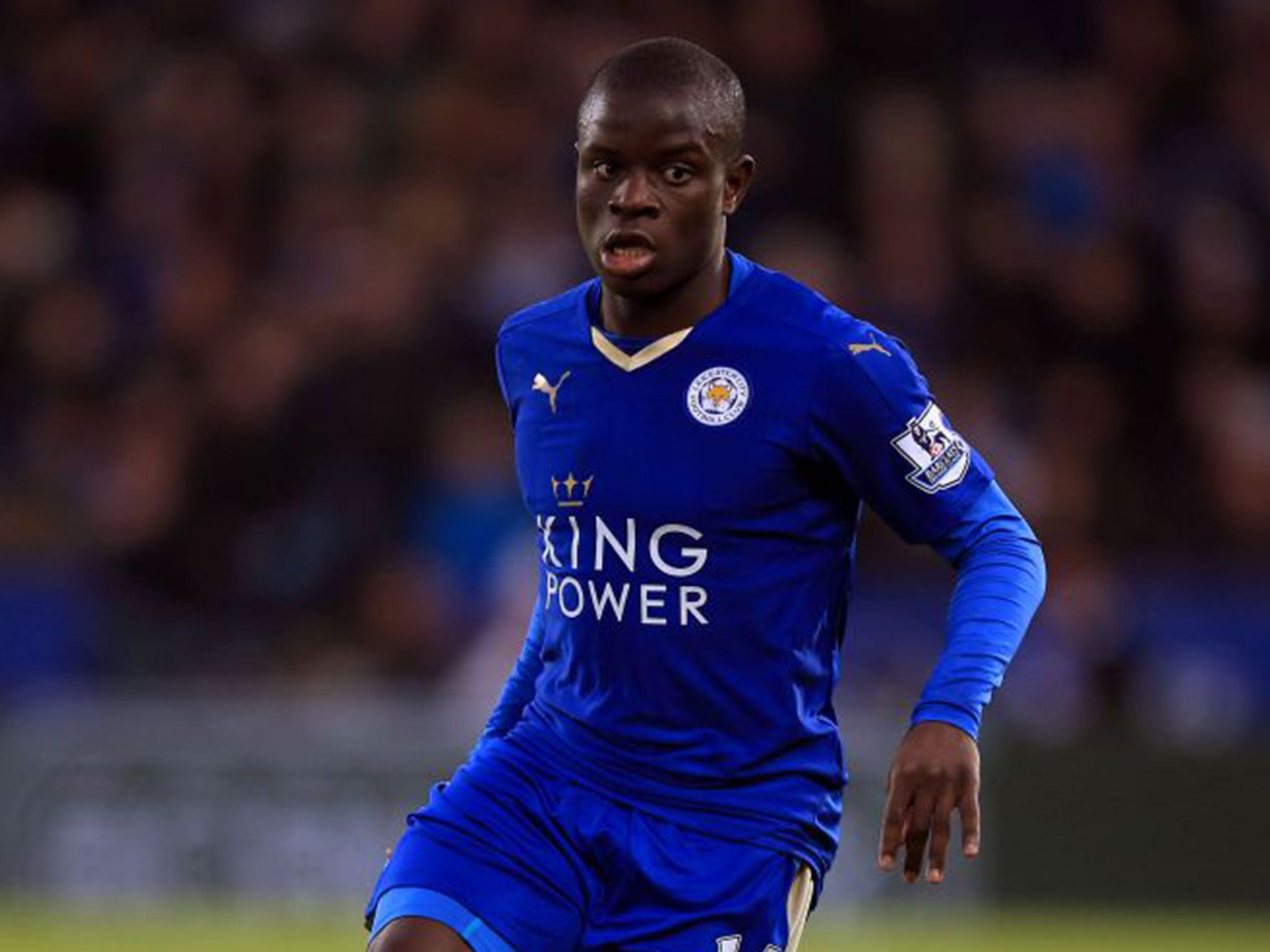PFA Awards 2016 comment: N'Golo Kante is Footballer 2.0 - but it will be one of his Leicester team-mates who will celebrate
Combative midfielder has been in phenomenal form this season

The image of a tuxedo-clad N’Golo Kante staggering around with a PFA trophy twice the size of his own body is difficult to envisage, not only because his Leicester team-mates are expected to out-vote the Frenchman but because the event itself – a sparkly night of pop stars and Hollywood pomp – seems incongruous with Kante’s on-field persona. Judging by the size of the PFA’s silver chalice, the Player of the Year Award was not designed for such a humble recipient.
Celebrating individual achievements in a sport fundamentally built on the power of the collective always seems a little strange; to serenade Riyad Mahrez is to deny and demerit his team-mates, and although the urge to simplify something as complexly interweaving as a football match is understandable we should, at least, look to redirect some of our hyperbole towards those that battle and toil in less glamorous areas of the pitch. Modern football tactics have dramatically altered the role of the central midfielder and, whilst England’s super clubs flounder without their own Kante or Dembele, Leicester and Spurs are showing what box-to-boxers bring to a title challenge – and how cutting-edge tactics help get the best out of them.
N’Golo Kante is a genius. He is a new archetype, a player that embodies football’s inevitable movement towards universality in an age of billionaire companies sculpting kids from as young as five. Kante is Footballer 2.0, an impossible amalgamation of all previous footballing incarnations - the laboratory experiment of a cartoon super-villain. He commands defensive midfield and weaves forward in attack with alarming precision, often appearing to move, think, and compute at a speed several steps ahead of the mere mortals that surround him. His fusion of quick-footed passing and defensive anticipation are not unique in world football but he is perhaps unmatched in his ability to both destroy and build – often simultaneously. And yet despite all this, it is hard to imagine him taking the top prize on Sunday.
PFA Premier League Team of the Season
Show all 11To overlook the impact of the central midfield engine is unforgivable, though our journey to this point is easy to trace. Truncated highlights packages make little time for the Kante’s and Dembele’s, whilst lazy pundits are settling back into the cosy, dead-eyed rhythm of the post-Neville age. If you aren’t looking closely, you just won’t notice how important the box-to-box player has become because, in such a messy world of overlapping variables, appreciating the indirect is difficult. But in truth Kante’s role is as vital to Leicester’s goalscoring as Jamie Vardy’s final touches, and as vital to their string of clean sheets as Wes Morgan’s last ditch tackles.
The global tactical landscape has progressed from the Spanish tiki-taka model towards the furious press-and-counter of the Klopp-ites, and with it the football pitch is being sucked inwards; the world’s best teams swarm in packs and minimise the distance between defence and attack, making Kante’s ability to hold onto the ball under pressure, swivel from the challenge, and make the first pass of the counter-attack a vital skill. Leicester and Spurs both utilise modern systems, and whilst Kante and Dembele help them maximise the team’s potential the reverse is also true.
Leicester’s ultra-narrow off-the-ball shape makes Kante’s job far simpler than his counter-parts’ at Chelsea, Arsenal, Man United, and Man City; in a compressed formation the Frenchman’s defensive zone is smaller, allowing him to lurk in tighter gaps and select which passing lines to cut off with greater ease. By contrast, the likes of Nemanja Matic and Yaya Toure seem perpetually confused, scurrying frantically around the pitch in a doomed attempt to cover the entire width and suffocate several playmakers simultaneously. Kante deserves enormous credit for his composure, but he benefits from an organisation born from a collective endeavour unmatched in the hazardously open formations that plague Manchester and West London.
The sweeping managerial changes at England’s ousted “Big Five” suggest that an appreciation of this dilemma is gradually being realised at boardroom level, where a succession of young appointments – from Pep Guardiola, to Antonio Conte, to Jurgen Klopp – look set to blow away the cobwebs; perhaps unsurprisingly, a cluster of managers in their sixties have laboured on with tiki-taka-inspired tactics that fail to recognise the changing complexities of the modern game. Many have lamented the quality of their signings last summer, but in reality neither Kante nor Dembele would have excelled under the tutelage of Louis van Gaal, Manuel Pellegrini, or Arsene Wenger.
The player makes the system and the system makes the player, and whilst the PFA Awards on Sunday evening will no doubt revel in this year’s top goalscorers it seems a pertinent time to question whether England’s biggest clubs – who lack both a Kante and a coherent tactical strategy – have been similarly unaware of the nuances that make championing individualism redundant.
Subscribe to Independent Premium to bookmark this article
Want to bookmark your favourite articles and stories to read or reference later? Start your Independent Premium subscription today.

Join our commenting forum
Join thought-provoking conversations, follow other Independent readers and see their replies